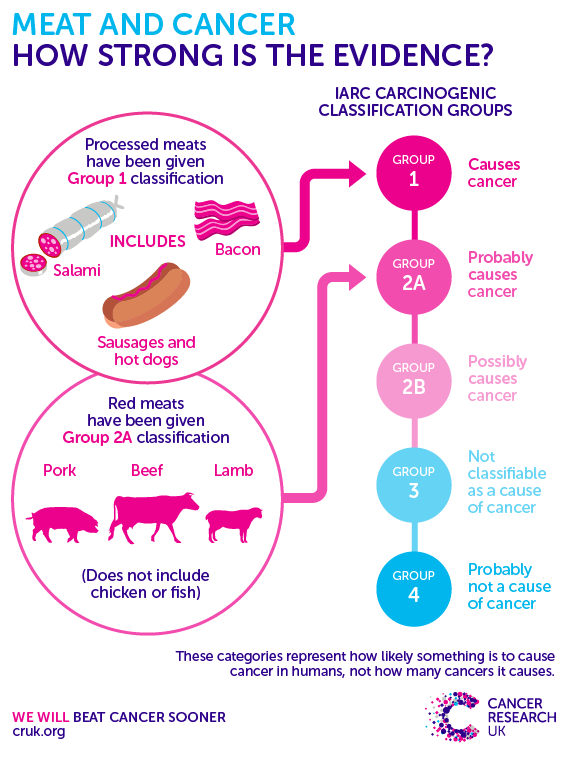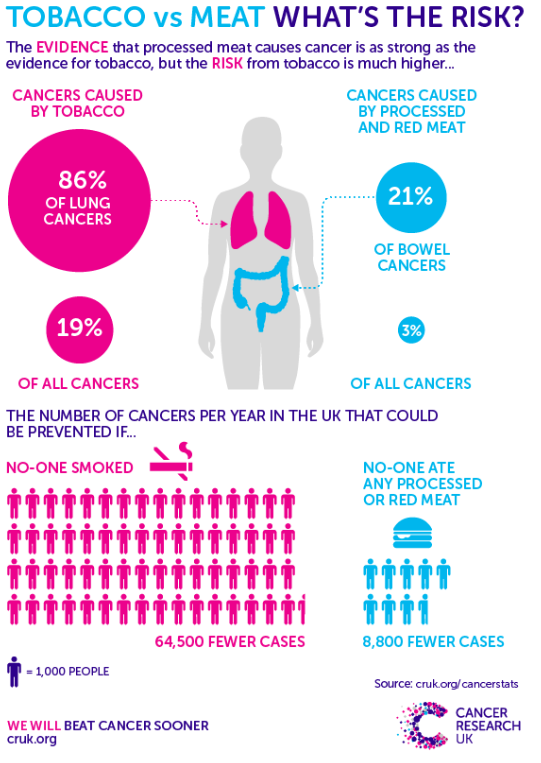Is your Christmas ham killing you?
In 2015, the International Agency for Research on Cancer (IARC) announced that processed meats were a group 1 carcinogen (ie there is convincing evidence they cause cancer). Other group one carcinogens include smoking, asbestos, UV radiation, and plutonium.
Initial news headlines conflated carcinogenicity with risk: “Processed meat is as bad for you as smoking!” But all these carcinogens do not carry the same risk. The IARC looks at causes of cancers, not risk.
Processed meats—including bacon, ham, salami, and other meats treated by curing, smoking, salting and fermentation—increase the risk of developing colorectal and stomach cancers, and more recently, have been linked to breast cancers in post-menopausal women. But the increased risk is not comparable to that of smoking and lung cancer: tobacco causes 86 per cent of all lung cancers, while processed and red meats cause 21 per cent of bowel cancers.

Eating 50g of processed meat a day (about two slices of bacon) increases the risk of developing colorectal cancer by 18 per cent. This is relative risk—comparing the incidence of cancer between two groups and looking at the difference. The rate of bowel cancer in New Zealand is 44.2 per 100,00, with a lifetime risk of about 6 per cent. This means 6 in every 100 people will develop colorectal cancer over their lifetime. If eating processed meats increases this risk by 18 per cent, this means about 1 extra person. In contrast, smoking increases your relative risk of developing lung cancer by 2,500 per cent.

These findings are all from observational studies, which identify links between events, but cannot prove that one causes another. Finding a genuine cause and effect between meat and cancer is up to research scientists.
So how do they think processed meats cause cancer? One culprit may be the nitrates and nitrites they contain. These compounds add nitrogen molecules to haeme in meat, keeping colour and flavour. In the gut, they become N-nitroso compounds (NOC) that damage the gut wall. Repair processes stimulate cell division, which leads to replication errors that may trigger neoplasms.
Haeme in red and processed meat also forms NOC during digestion. But cancer-causing compounds (polycyclic aromatic hydrocarbons and heterocyclic amines) are also produced when cooking red meats at high temperatures or during smoking of processed meats. Evidence for these biological processes is not yet conclusive.
The greatest risks for developing colorectal cancer are age and a family history. The greatest modifiable risks are alcohol, obesity, physical inactivity, and smoking. So, while processed (and red) meats contribute to the risk of colorectal cancers, cutting down rather than giving up your bacon may be sufficient—all things in moderation for 2018!
Sources:
- Infographic source: Cancer research UK: Processed meat and cancer—what you need to know. http://scienceblog.cancerresearchuk.org/2015/10/26/processed-meat-and-cancer-what-you-need-to-know/
- IARC. (2015). Q&A on the carcinogenicity of the consumption of red meat and processed meat. http://www.iarc.fr/en/media-centre/iarcnews/pdf/Monographs-Q&A_Vol114.pdf
- Kobayashi, L. (2014). Red meat and cancer: the biological evidence. PLOS Blogs: Public health perspectives. http://blogs.plos.org/publichealth/2014/11/17/red-meat-biological-evidence/
- Ministry of Health. (2017). New Cancer registrations 2014: https://www.health.govt.nz/publication/new-cancer-registrations-2014
- Richardson, A. et al. (2016). Modifiable lifestyle factors that could reduce the incidence of colorectal cancer in New Zealand. New Zealand Medical Journal. 129(1447): 13-20.
- Turner, N. & Lloyd, S. (2017). Association between red meat consumption and colon cancer: a systematic review of experimental results. Experimental Biology and Medicine. 242(8): 813-839.